Along the beautiful coastline of Gambia, a country known for its rich marine life and fishing tradition, local fishermen are now crying out for help. The sea, which has fed their families and paid their children’s school fees for decades, is no longer bringing the same blessings it used to. Instead, they now face shrinking catches, rising fuel costs, and competition from big foreign trawlers, especially from Europe and Asia.
In towns like Gunjur, Kartong and Sanyang, many local fishermen have said their fishing business is no longer sustainable. According to Mustapha Manneh, a Gambian journalist and environmental researcher who has been covering the situation for years, foreign industrial fishing companies are sweeping through Gambian waters and hauling out large quantities of fish that the locals depend on, especially bonga and sardines. These are small but important fish that are used by many Gambians for cooking and also sold in local markets for income.
Manneh’s reports show that a lot of these fish are not even used for feeding people. Instead, they are taken to fishmeal factories built along the coast. These factories process the fish into powder and oil, which are then exported to countries like China and Spain to feed farmed fish, pigs, and poultry. This business is booming, but the locals are not benefiting from it.
Instead, they are suffering. The fish that used to be cheap and available in every Gambian home is now scarce and expensive. Fishermen are forced to go further and deeper into dangerous waters to find fish, risking their lives in the process. Some have even been reported missing at sea.
Women, who play a big role in the fish value chain by smoking, drying, and selling fish in local markets, are also losing their source of income. Many of them now sit idle, with no fish to process or sell. Some have started small businesses to survive, but many are struggling.
Apart from the lack of fish, the fishmeal factories are also said to be causing serious environmental problems. Manneh’s investigations show that some factories are dumping waste into the ocean, polluting the water and killing more marine life. Residents in Gunjur have reported dead fish washing up on the beach and a strong smell coming from the factory. Tourists are also avoiding some of these areas due to the pollution, affecting the tourism sector as well.
The people are not taking it quietly. Communities have started speaking out. Youth groups and local leaders are calling on the Gambian government to cancel some of the fishing agreements with the European Union and demand better monitoring of foreign trawlers. Some are asking for more transparency in the seafood trade so that people in Europe and China know where their fish comes from and what it costs poor countries like Gambia.
Mustapha Manneh said that what is called “sustainable fish farming” in Europe often depends on fish taken from African countries like Gambia, where people rely on them for food and survival. He believes that this system is not fair and needs to be reviewed.
While Gambian authorities have promised to look into the matter, many locals say not much has changed. They believe stronger action is needed to protect their waters and their future. They want fishing agreements that benefit Gambians first and punish companies that destroy their environment.
This crisis in Gambia is a warning to other West African nations, including Nigeria, Ghana, and Senegal, where similar issues are already happening. If foreign industrial fishing continues unchecked, more coastal communities may soon find themselves in the same situation—without fish, without food, and without hope.
